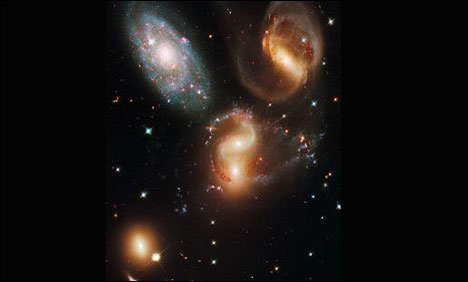- Web
- Humsa
- Videos
- Forum
- Q2A



Closer scrutiny of radiation left over from the creation of the universe shows the Big Bang took place about 13.8 billion years ago, 100 million years earlier than previous estimates, scientists said.
The findings are among the first results from analysis of data collected by the European Space Agency's Planck spacecraft, which is providing the most detailed look to date at the remnant microwave radiation that permeates the universe.
This relic radiation was first detected in 1964 and later mapped by two NASA spacecraft - COBE, launched in 1989, and WMAP, which followed two years later. With even greater sensitivity, Planck has picked out details of tiny temperature variations in the so-called cosmic microwave background.
The fluctuations, which differ by only about 100-millionthsof a degree, correspond to slightly more dense regions of space, places that later gave rise to the stars and galaxies that fill the universe.It's as if we've gone from a standard television to a high-definition television. New and important details have become crystal clear," Paul Hertz, NASA's director of astrophysics, told reporters on a conference call.
Overall, the new data fits well with existing models of how the universe evolved, but it presents some new puzzles as well."The variations from place to place in the map that Planck has made tell us new things about what happened just 10nano-nano-nano-nano seconds after the Big Bang when the universe expanded by 100 trillion, trillion times," said Charles Lawrence, Planck project scientist with NASA's Jet Propulsion Laboratory in Pasadena, Calif.
"We can see the subtle effects of gravitational pulls from literally everything in the universe."Compared to the previous best measurements, the universe is a little older and, surprisingly, is expanding a little more slowly than currently accepted standards.Plank's data also shows that ordinary matter - the stuff that makes up stars, galaxies, planets and everything visible -accounts for a relatively tiny 4.9 percent of the universe.
Dark matter, which does not interact with light but can be detected by its gravitational pull, comprises 26.8 percent of the universe, nearly one-fifth more than previous estimates.
The rest of the universe is dark energy, a mysterious and recently discovered force that defies gravity and is responsible for speeding up the universe's rate of expansion. New results from Planck show dark energy accounting for 69 percent of the universe, slightly less than previously estimated.
The research is the fruit of Planck's first 15 months on orbit. Additional information, including details of how the universe's early light was polarized, are expected next year.
 Another problem is preventing the Mars rover Curiosity from resuming its science experiments.
The mission's chief scientist said Monday the rover went into safe mode again over the weekend because of a computer file error. In safe mode, activities are on hold but the rover remains in contact with Earth.
Curiosity was sidelined earlier this month after ..... Read more
Another problem is preventing the Mars rover Curiosity from resuming its science experiments.
The mission's chief scientist said Monday the rover went into safe mode again over the weekend because of a computer file error. In safe mode, activities are on hold but the rover remains in contact with Earth.
Curiosity was sidelined earlier this month after ..... Read more
 Two molecules that play an important role in the survival and production of nerve cells in the brain, including nerve cells that produce dopamine, have been identified by scientists at Karolinska Institutet in Sweden.
The discovery may be significant in the long term for the treatment of several diseases, such as Parkinson’s disease.The same scienti..... Read more
Two molecules that play an important role in the survival and production of nerve cells in the brain, including nerve cells that produce dopamine, have been identified by scientists at Karolinska Institutet in Sweden.
The discovery may be significant in the long term for the treatment of several diseases, such as Parkinson’s disease.The same scienti..... Read more
 Internet messenger applications such as Skype, Viber and WhatsApp face being banned in Saudi Arabia if operators fail to allow authorities in the kingdom to censor them, industry sources said on Monday.
Local telecommunication providers have been told to ask the operators of the services to furnish means of control, an official at the kingdom’s Co..... Read more
Internet messenger applications such as Skype, Viber and WhatsApp face being banned in Saudi Arabia if operators fail to allow authorities in the kingdom to censor them, industry sources said on Monday.
Local telecommunication providers have been told to ask the operators of the services to furnish means of control, an official at the kingdom’s Co..... Read more












 Clean Chit (Faisal Raza Abidi ...
Clean Chit (Faisal Raza Abidi ...  Akhir Kiyon - 16th December 2...
Akhir Kiyon - 16th December 2...  To The Point - 16th December ...
To The Point - 16th December ...  Capital Talk â
Capital Talk â  Kal Tak - 16th December 2013
Kal Tak - 16th December 2013  Bay Laag - 16th December 2013
Bay Laag - 16th December 2013  Kharra Sach - 16th December 2...
Kharra Sach - 16th December 2...  Awaam - 15th December 2013
Awaam - 15th December 2013 





 Gold Miner
Gold Miner  Superbike GP
Superbike GP  Whipsaw Fighter
Whipsaw Fighter  PacMan
PacMan 


